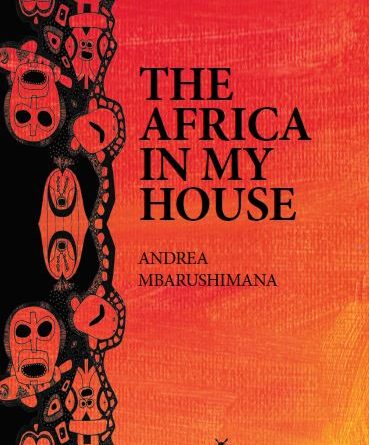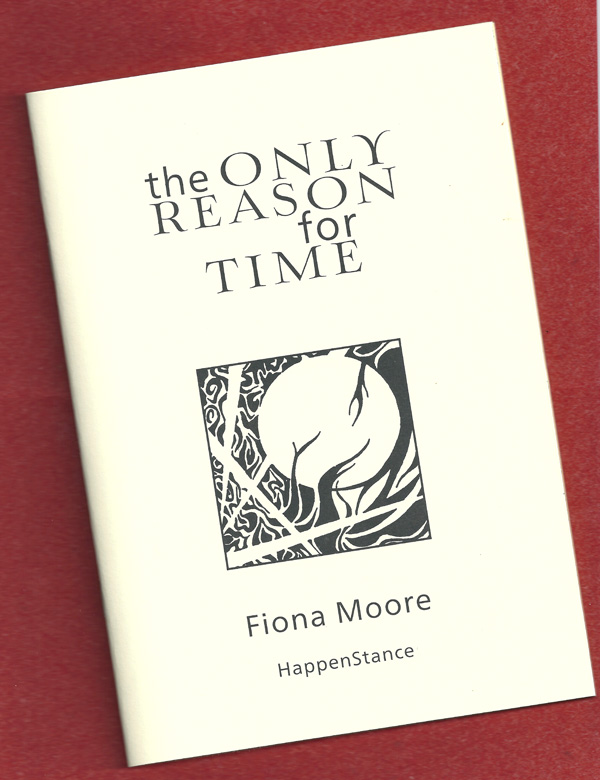The Africa In My House by Andrea Mbarushimana
– Reviewed by Afric McGlinchey –
An English-born community worker who has worked with refugees and immigrants, Andrea Mbarushimana is acutely aware of the risks and difficulties of ‘exoticising’ her poetry by writing about another culture. As she says in her dedication to The Africa In My House, ‘I didn’t want to be just another mazungu (white foreigner) giving my white perspective on someone else’s world.’
She also lived in Rwanda for two years. Even this fact might give rise to the criticism that her chapbook is simply a tourist’s perspective of a country, but she moved from being an outsider, a ‘mazungu’, to becoming part of a Rwandan family, when she married a colleague at the local community school and had a child with him. ‘The Africa In My House’ is ‘literal’ as well as metaphorical, and her emotional investment warrants acknowledgment that her subject matter is earned.
The portraits and fables in this slim volume are told with simplicity and respect. She reveals her own naivety and ‘unthinking racism’ with a humility that would charm even the most critical of readers. Her immersion in the culture she adopts through marriage is demonstrated in the persona poems and evocations of African fables and folk tales. Her own almost-invisibility is particularly appealing. Where the poet is present, the narrative is in the third person, from the perspective of her new community, and narrated with a wry humour:
Porn-star/lottery-win-white-girl
Sits in the corner
With her African tea (Nido!)
So sugary it makes her teeth hurt
And tries to smile politely.
(‘Muzungu’)
Their view changes when she marries a fellow-teacher, ‘in a ceremony to which the whole village is invited’: ‘They don’t call her Muzungu anymore.’
Inevitably, the poems touch on racism, but they do so lightly, and the wry tone is maintained. When she returns to England with her new family, the perspective shifts:
Middle-class-white-girl (which at least is true) walks her baby in the park
And realises that with her brown-girl-in-the-pram
She is now trashy/easy/benefits-class-white-girl
She is nigger-loving-traitor-white girl
(‘Muzungu’)
It is easy to succumb to the clichéd images westerners associate with Africa, and sometimes Mbarushimana comes precariously close, but then swerves away with empathetic insight: ‘Tattered kids on their twelve-hour-tired feet / Offer peanuts to hermetically-sealed bus windows (‘Out of Water’). Again and again, she pre-empts the reader’s assumptions – and her own: ‘I showed you a photo of some kids I knew./ You described it back to me:/A picture of brown, African children / kwashiorkor bellies distended under ragged/ T-shirts stained with dirt…. ‘Poor kids,’ you said.//And in my shock, I forgot their names…./and felt as though you’d taken out my eyes/replacing them with TV screens’ (‘Neighbourhood Kids’).
Occasional typos and the old-fashioned and inconsistent capitalisations of each line are a minor irritation. The appealing illustrations have an African quality and are the author’s own. The poems, for the most part, take the form of loosely formed free verse, tercets and prose poems. These often feel like diarised accounts:
When I visited Nyaruteja the first time I was struck by its frontier-town atmosphere. I noticed that people who sold brochettes – barbecued meat on skewers – by the side of the road, always left the goat heads on. Apparently this is because, one time, someone discovered that they had eaten a dog kebab.
(‘Tales from the Sticks’)
The gaining of a culture is not without its difficulties. In ‘Transactions’, ‘he looks at me like I am his white queen,’ while she confronts the guilt of the west’s profit from mining: ‘Granny had her diamonds,/ Grandad his gold,/ now we have our phones, our iPads.’ And she, for her part, is aware that ‘privilege confers a dark heart/no matter how hard you try/to stay clean.’
There are many strong pieces here, another of which is ‘God of Shadows’, which describes a young girl’s innocent terror at being secretly pregnant and her attempts to resolve the problem alone:
Lying in the pocket of light, she can’t remember what the Medicine Man said, but she appeals to her ancestors through the spirit of Ryangombe. Her words trip and spill over each other and jumble and blur and eventually, she invokes a kind of hysteria, a kind of trance. The candle is burning down. An owl screeches outside and she jerks, half awake. She takes the knife to the shadow of her belly and cuts.
Details are vivid and characters well-evoked: ‘You wore your children like orbiting moons’ (‘Luce’); ‘Mobile-phone-print-wrap and/Dame Edna sunspecs’ (‘Gatyazo Bar’). Mbarushimana is a visual person, but her other senses are also alert and alive to her own new experiences and those of others: when her husband sees fireworks for the first time, ‘fiery chemical blooms / lit by their own smoke’ it reminds him of the ‘shells exploding with laval yolk,/cracking the sky’ (‘Healing’).
One can’t think about Rwanda without thinking of the genocide, of course, and the inevitable post-traumatic fallout for a generation. But though there are harrowing stories here, the focus is predominantly on present, day-to-day lives, and what emerges is a strong sense of community and an easy spontaneity of affection. In ‘Brother!’: ‘They find each other in the street,/begin to laugh and snap their fingers….little fingers of opposing hands twisted together.’ This humanity lifts the poems into a state of grace.
Having taken this brave risk, having interrogated her own feelings and prejudices, Andrea Mbarushimana gives the reader the opportunity to do the same. This is a book I will re-read and think about for quite some time.



